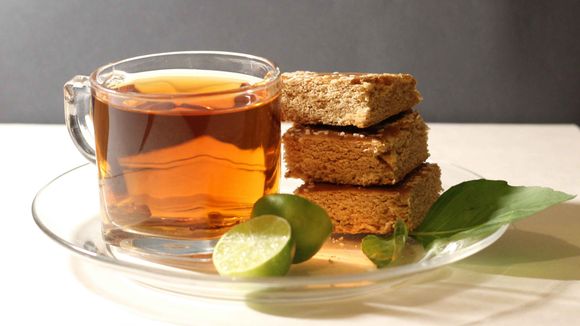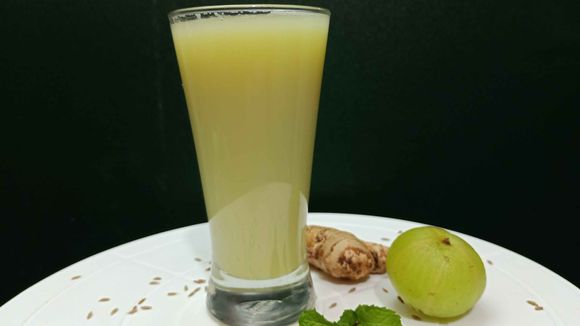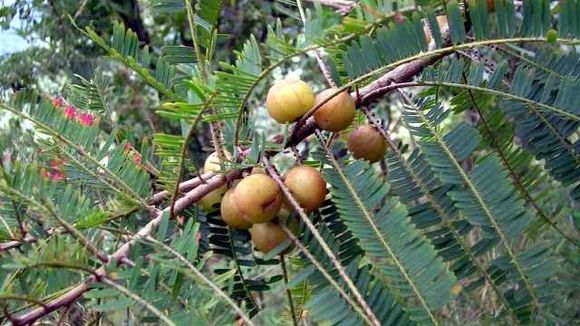Natural Remedies and Home Preparation
1. Amla Juice
Amla is highly rich in Vitamin C, which boosts immunity and fights off several diseases (2).
The juice can be made at home by grinding fresh Amla and then filtering it. Consuming a tablespoon of Amla juice mixed with honey daily can significantly enhance your immune system.
2. Amla Powder
Amla powder, made from dried Amla, is an excellent antioxidant and can be used to improve digestion and alleviate inflammation (3)
To prepare, sun-dry Amla, then grind into a fine powder. This powder can be consumed with warm water or mixed with honey.

Photo by reyhaneh mehrnejad on Unsplash
3. Amla Tea
Amla tea, made from dried Amla pieces, can be a potent antioxidant and anti-inflammatory agent (4).
To prepare, boil dried Amla pieces in water, strain and consume warm.
Botanical Information
The Amla tree, Phyllanthus emblica, belongs to the family Phyllanthaceae. It's a deciduous tree that grows up to 5-18 meters tall. The fruit is nearly spherical, light greenish-yellow, quite smooth and hard on appearance, with six vertical stripes or furrows. It is native to the Indian subcontinent and Southwest Asia.

Scientific References
Numerous scientific studies have explored the therapeutic properties of Amla.
A study published in the "International Journal of Molecular Sciences" in 2020 demonstrated its antioxidant and immune-boosting properties.
Another study published in the "Journal of Ethnopharmacology" in 2011 evidenced Amla's anti-inflammatory and digestive health benefits.
Questions and Answers
Q: Can I consume Amla if I am pregnant or breastfeeding?
A: While Amla is generally safe, it's always advisable to consult with a healthcare professional before incorporating any new elements into your diet during pregnancy or breastfeeding.
Q: Can Amla cause any side effects?
A: While Amla is generally considered safe, excessive consumption may lead to certain side effects like heartburn, increased urination, or skin allergies.
Q: Can Amla be consumed with other medications?
A: Though Amla is a natural fruit, it can interact with certain medications due to its potent medicinal properties. Always consult your doctor before consuming Amla alongside any medication.
Q: Can Amla juice be consumed on an empty stomach?
A: Yes, Amla juice can be consumed on an empty stomach. In fact, it can aid in detoxification and boost metabolism when consumed early morning.
Q: Can Amla be given to children?
A: Yes, Amla can be given to children in moderate amounts, but it's always advisable to consult with a pediatrician before giving any new foods or supplements to your child.
References
- Caldecott, T. (2006). Ayurveda: The Divine Science of Life. Elsevier.
- Akhtar, M. S., Ramzan, A., Ali, A., & Ahmad, M. (2011). Effect of амла fruit (Emblica officinalis Gaertn.) on blood glucose and lipid profile of normal subjects and type 2 diabetic patients. International Journal of Food Sciences and Nutrition, 62(6), 609-616.
- Baliga, M. S., & Dsouza, J. J. (2011). амла (Emblica officinalis Gaertn), a wonder berry in the treatment and prevention of cancer. European Journal of Cancer Prevention, 20(3), 225-239.
- Kumar, K. S.Bhowmik, D., Duraivel, S., & Umadevi, M. (2012). Traditional and medicinal uses of Indian gooseberry. International Journal of Pharmaceutical Sciences and Drug Research, 4(4), 288-291.









